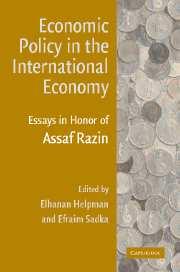Book contents
- Frontmatter
- Contents
- List of Contributors
- Preface
- Introduction
- PART ONE FINANCIAL ISSUES IN OPEN ECONOMIES: THEORY
- 1 Crises: The Next Generation?
- 2 Solutions (?) to the “Devaluation Bias”: Some Preventive Measures to Defend Fixed Exchange Rates against Self-Fulfilling Attacks
- 3 Growth-Enhancing Effects of Bailout Guarantees
- 4 Risk and Exchange Rates
- PART TWO FINANCIAL ISSUES IN OPEN ECONOMIES: EMPIRICS
- PART THREE ECONOMIC GROWTH: THEORY AND EMPIRICS
- PART FOUR PUBLIC ECONOMICS
- PART FIVE POLITICAL ECONOMY
- Author Index
- Subject Index
4 - Risk and Exchange Rates
Published online by Cambridge University Press: 03 November 2009
- Frontmatter
- Contents
- List of Contributors
- Preface
- Introduction
- PART ONE FINANCIAL ISSUES IN OPEN ECONOMIES: THEORY
- 1 Crises: The Next Generation?
- 2 Solutions (?) to the “Devaluation Bias”: Some Preventive Measures to Defend Fixed Exchange Rates against Self-Fulfilling Attacks
- 3 Growth-Enhancing Effects of Bailout Guarantees
- 4 Risk and Exchange Rates
- PART TWO FINANCIAL ISSUES IN OPEN ECONOMIES: EMPIRICS
- PART THREE ECONOMIC GROWTH: THEORY AND EMPIRICS
- PART FOUR PUBLIC ECONOMICS
- PART FIVE POLITICAL ECONOMY
- Author Index
- Subject Index
Summary
Nominal exchange risk is a ubiquitous factor in international economic policy analysis. For example, sudden appreciations of the dollar following financial crises outside the United States often are ascribed to “safe haven” portfolio shifts. The elimination of national currencies in Europe has been rationalized in part by the claim that uncertain exchange rates discourage trade, and thereby hamper the full realization of the gains from removing other obstacles to commodity and asset-market integration.
Unfortunately, the analytical underpinnings of such widely discussed phenomena have received scant attention. In analyzing the properties of stochastic general-equilibrium monetary models, researchers typically rely on a certainty equivalence assumption to approximate exact equilibrium relationships. This practice, as Kimball (1995, p. 1243) remarks, “precludes a serious welfare analysis of changes that affect the variance of output.” In the relatively rare cases in which higher moments are considered theoretically, tractability usually has required the assumption of instantaneously flexible commodity prices and wages. That modeling choice not only assumes away much of the real effect of nominal exchange rate uncertainty. It simultaneously precludes discussion of the feedback from monetary nonneutralities to market risks, and instead imposes exogenously the covariances between monetary shocks and consumption levels. And it is unrealistic. There is strong, indeed overwhelming, empirical evidence that the nominal prices of domestically produced goods tend to adjust far more sluggishly than exchange rates.
- Type
- Chapter
- Information
- Economic Policy in the International EconomyEssays in Honor of Assaf Razin, pp. 74 - 118Publisher: Cambridge University PressPrint publication year: 2003
- 19
- Cited by



